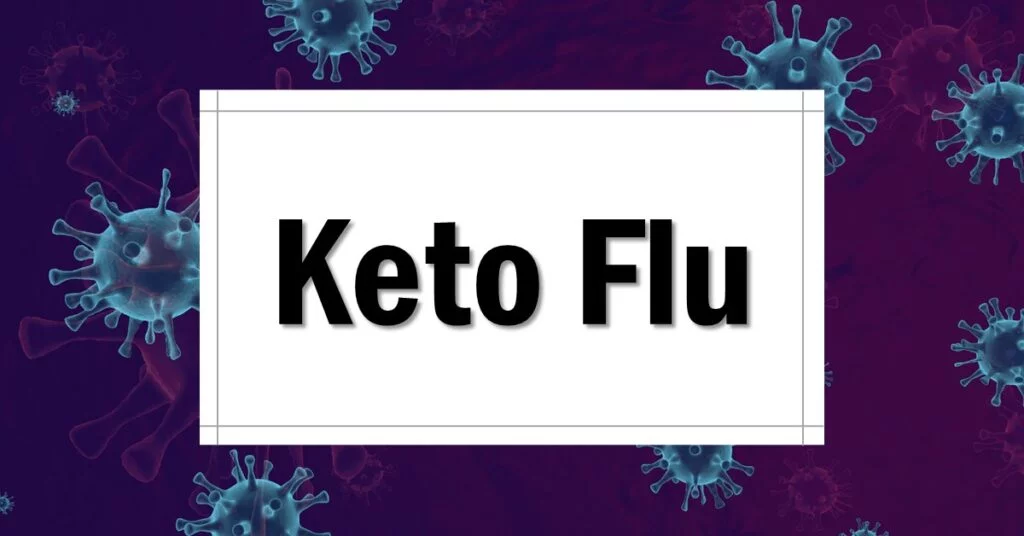Keto flu can knock you out for days at a time, but it does not have to be this way! There are a number of tips and tricks to prevent or manage the symptoms of keto flu. Read on and we will take you through what keto flu is, what you can do to try and prevent it, and if you do get it, our top tips for overcoming the keto flu!
Disclosure: Some of the links in this article may be affiliate links, meaning that we may earn a small commission if you click through using our link and make a purchase. Please be assured that this will not cost you any extra money. Also, please be assured that we either use the products we recommend personally, or have been recommended by trusted friends who currently use them.
What Is Keto Flu?
If you have been reading about the keto diet for any length of time, you will have likely come across the term ‘keto flu‘, don’t worry though, it does not have to be as drastic as it sounds.
The keto diet (aka the ketogenic diet) encourages a person to reduce their carbohydrate intake below 20 grams a day (5% of all of the food they eat), increase their fat intake to around 70% and protein to around 25% of the total food consumed, it is a high-fat, low-carb diet.
- 5% Carbohydrates
- 25% Protein
- 70% Fat
In simple terms, the keto diet sees the body moving from burning sugar (carbs) to burning fat for fuel.
This regulates the insulin level in the body which leads to many health benefits including increased energy levels.
This Keto for Beginners article will take you through everything you need to know about getting started on the keto diet.
Keto flu is a term used to describe the flu-like symptoms that can occur when somebody has reduced their carb intake, and as such, is transitioning onto the keto diet.

This can happen the first time you start to eat a keto lifestyle, but, bad news, if you fall ‘off the keto wagon’ and need to get your body back into ketosis, you may find that you get the keto flu, but we will discuss this further below.
When Does Keto Flu Happen?
Keto flu happens as your body transitions from burning glucose as its main fuel source to burning fat for energy. This metabolic process is known as your body entering ketosis.
Each person’s body will take a different amount of time to enter ketosis. This can be anywhere from a few days to several weeks, so there is no definitive time as to when the keto flu happens. When your body is in ketosis, ketones from fat will be produced, which are burned for energy.
Why Is It Called Keto Flu?
Keto flu is not the flu at all, it is not contagious in any way! The only reason that it is named the ‘flu’ is due to the symptoms that you get when your body is going through this process.
You SHOULD NOT get the following symptoms as these are associated with the actual (influenza) flu: vomiting, respiratory problems, fever, and chills. If you are having any of these symptoms, please seek medical advice as this is not likely attributed to your body transitioning into ketosis.
As stated above, some people will have no symptoms at all, other people will have some of the symptoms, and very few, rare people may get all of the symptoms below;
Common Keto Flu Symptoms
There are a number of common symptoms of the keto flu, we have listed the most common below for you.
- Headaches
- Fatigue
- Dizziness
- Muscle Cramps
- Aching Muscles
- Restlessness
- Poor Levels of Concentration, aka ‘Brain Fog’
- General lack of Motivation

What Causes The Keto Flu?
When you drastically reduce the number of carbohydrates that you are consuming, your body has to adjust.
This period of adjustment involves your body re-programming itself to use fat as fuel. This is confusing for your body, as it has never known anything other than running on sugar.
There are a number of different things which can impact whether you actually get the keto flu and if you do, how it will impact you.
We will discuss the potential causes of the keto flu below and, we will give you our top tips to overcome these symptoms.
- Change in Fuel Source – As discussed above, the body transitioning from burning fat after a lifetime of using carbohydrates (glycolysis) as its primary fuel source, can send the body into a state of flux when it does not quite know what it is doing.
- Dehydration – this is quite possibly the second most common cause of the ‘keto flu’ as becoming dehydrated is easy to do when you move onto a keto lifestyle. Carbohydrates are stored as glycogen in your liver, when they are stored, they are bound with water molecules. When you reduce your carbohydrate intake, these glycogen stores are depleted (this is why you may find that you urinate more when you start your keto journey). This links in with the electrolytes imbalance which we discuss below. Even if you are drinking the same volume of water as you did previously, you will not be getting all of the additional hydration from carbs. However, it is not as simple as just drinking plenty of water, which is what we will discuss below. If you are interested in how much water you should be drinking on a keto diet check out our article.
- Inbalance in Electrolytes – Electrolytes are the minerals in your body (in water) that help conduct electricity. They also help regulate the amount of water that is in your body. They do this through monitoring and regulating the pH levels and nutrients in your body. If they detect an imbalance, they will move nutrients into cells and waste out of them, in order to reach an equilibrium. Your cells properly replenished is what keeps your muscles, including your brain, working in an efficient manner.
- Sugar Withdrawl – Most of us will not need science to tell us that sugar is addictive! It’s this addictive nature that makes us reach for a cookie to make us ‘feel better’, fully knowing that it will not beyond that initial ‘sugar rush’. When we remove sugar from our diet, we get withdrawal symptoms. Scarily, these withdrawal symptoms are not dissimilar to those that persons experience when they are coming off drugs or alcohol addiction: insomnia, reduced cognitive function, irritability, depression, anxiety, and cravings to name but a few. These can all exasperate the keto flu symptoms.
- Vitamins and Nutrients Deficiencies – if you are not eating a balanced keto diet, you may be missing out on essential nutrients your body needs. The main issues that people appear to have with keto are;
- Sodium Deficiency – this may lead to fatigue, feeling nauseous, muscle cramping, headaches, and even constipation. This can be avoided by adding electrolytes into your diet
- Magnesium Deficiency – too little magnesium in your diet can lead to an abnormal heart rate (you may feel it racing), numbness, anxiety, and even muscle spasms. Magnesium supplements can be taken to try and prevent these symptoms, or you can actively add magnesium-rich foods into your diet. Leafy greens such as cabbage, kale, spinach, Swiss chard, watercress, and lettuce are great options.
- Potassium Deficiency – low potassium levels may lead to a range of different symptoms, including muscle cramping, a feeling of weakness, fatigue, and a general feeling of being unwell. Foods naturally high in potassium that are keto-friendly include; spinach, broccoli, mushrooms, and cucumber.
So What Does Having The Keto Flu Actually Feel Like?
As discussed above, keto flu, should not feel like the ‘normal’ flu (influenza), most people report mild symptoms, the most common being a headache. After a headache, the most common symptom people seem to suffer is the general feeling of fatigue, maybe with some muscle cramping.
The actual effect will vary from person to person until your body is past the initial ‘carb withdrawal’.
How Long Does The Keto Flu Last?
Hopefully, we haven’t scared you with our discussion of the keto flu. The best news, for the average person the keto flu only lasts 3-4 days and the symptoms may not be as bad for all of these.
This does vary from person to person. Once, everybody has a different adjustment period until your body becomes fat-adapted, the symptoms will start to decrease until they disappear.
What To Do To Avoid Getting Rhe Keto Flu
There are a few steps you can take in order to try and avoid getting the keto flu.
There is no guarantee that even if you follow all of these top tips that you will not get keto flu, however, you are giving yourself the best possible opportunity to avoid it.
Top Tips To Avoid Keto Flu
- Drink Plenty Of Water – Drinking plenty of water will keep to hydrated, this will replace the water that you will be losing
- Replace lost Electrolytes – adding salt to food will help replace the salt that is lost with the water loss. As well as this eating foods that are high in potassium will help to maintain a healthy balance of electrolytes. Some people will take an electrolyte supplement to combat this, but drinking a simple keto bone broth can be a simple solution. Another option is to add pink salt (aka Himalayan salt) to your water and drink it in the morning, this will assist with preventing electrolyte loss.
- Avoid Strenuous Exercise – Check out our article on exercising on keto, our advice would be to not do strenuous exercise until you have entered ketosis and your keto flu symptoms (if you have any) have started to subside. Light exercise should be ok, especially if your body is used to it. This will prevent any muscle soreness and fatigue.
- Eat Enough Fat – did you ever think you would read a statement like that?! By ensuring that you are eating enough keto-friendly foods which are high in fat in your diet, you are likely to stave off cravings, which can make you feel worse. By eating enough fat, you will be ensuring that your body has an alternative fuel source to burn when it has exhausted the glucose, this will make the transition from carb fueling to fat fueling easier.
- Get Plenty of Sleep – easier said than done, we know. Getting enough sleep will help your energy levels, which may be depleted as your body transitions into ketosis. Getting more sleep will help you with this.
Keto Flu, FAQs
Here are some of the most frequently asked questions we get asked in relation to the keto flu. If you have any further questions, please let us known in the comments below and we will do our best to answer them for you.
Final Thoughts On The Keto Flu
There you have it! A whirlwind tour of everything you need to know about the keto flu, and most importantly, our top tips on how to avoid it and if you do get it, what steps you need to take to ensure that you minimize its effect. Remember, it is only temporary whilst your body transitions and you will soon be feeling the benefits of a keto lifestyle.
Let us know in the comments below what your experience has been with the keto flu. Do you have any top tips you can share with our readers to prevent or cure the symptoms?


